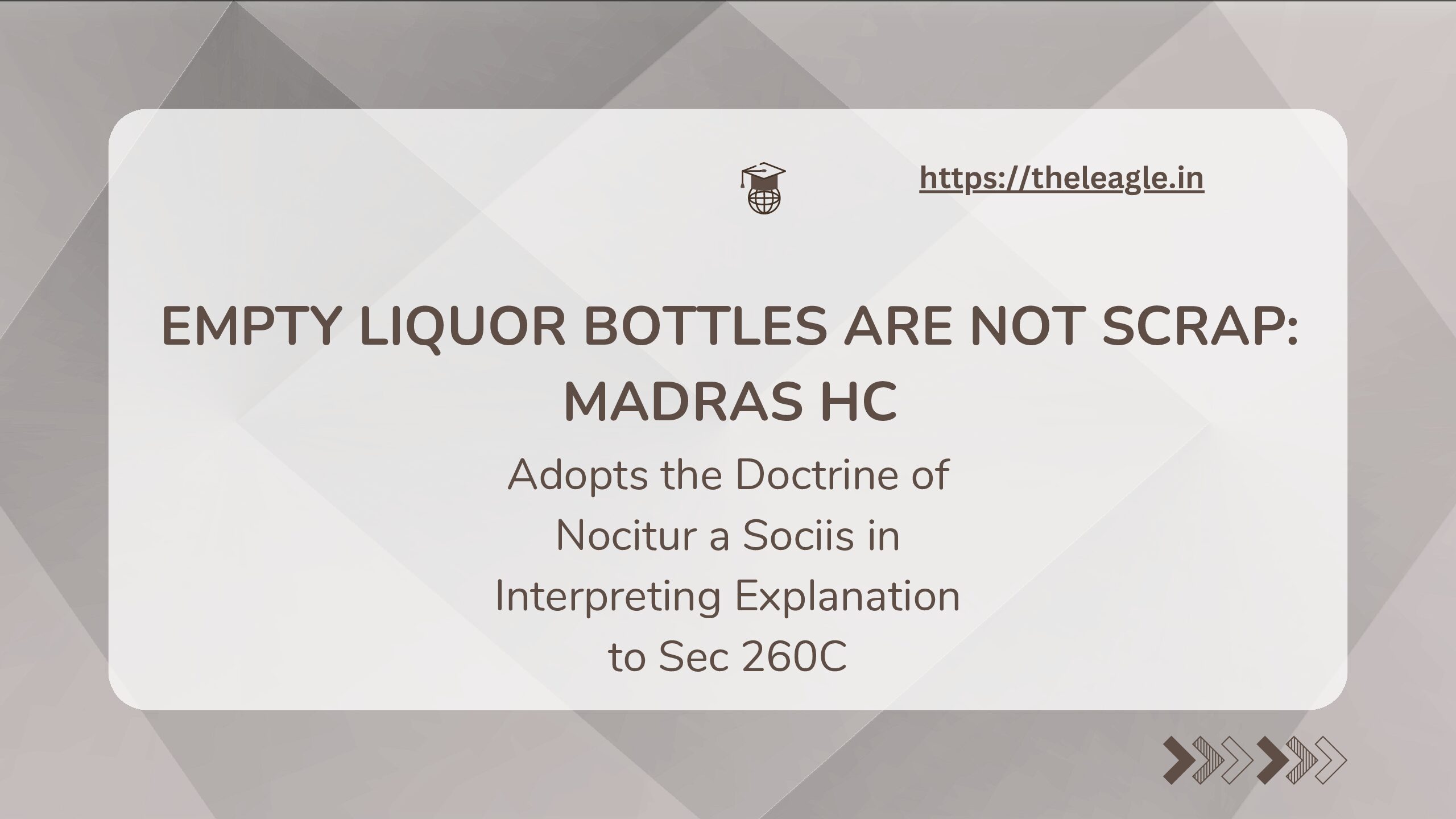The Madras High Court in a recent decision[1] held that empty liquor bottles do not constitute scrap under Section 206C, IT Act, 1961. Accordingly, it held that the petitioner, M/s Tamil Nadu State Marketing Corporation Ltd (‘TASMAC’), was not obliged to deduct tax at source when collecting licence fee from bar licencees who were authorized to sell empty bottles left behind by customers.
Facts
The petitioner, TASMAC, challenged the orders of the Income Tax Department wherein it was treated as an ‘assessee in default’ for failure to deduct tax at source under Section 206C, IT Act, 1961. The Income Tax Department contended that the petitioner should have deducted TCS on the amounts tendered by the successful bar licensee towards tax from sale of empty bottles by treating the sale of bottles as scrap. The petitioner has been given a statutory monopoly to sell – wholesale and retail – Indian Made Foreign Liquor (IMFL), in the State of Tamil Nadu. The petitioner invites tenders for running bars adjacent to its retail vending liquor shops. It floats tenders to select third-party bar contractors to sell eatables and collect empty bottles from bars adjacent to its retail shops. As per the terms of bar licence, the licencee was allowed monetise empty bottles. The petitioner selected the winning tenders, used to retain 1% of the tender amount as agency commission and remit the remaining 99% to the State Government.
The Income Tax Department contended that the petitioner fulfilled the conditions of being a seller under Explanation to Section 206C of the IT Act, 1961. The Department elaborated that the petitioner alone had the right over empty bottles as only it could award tenders for their sale and thus the awarding of tenders amounted to it selling scrap to winning bidders through the tendering process.
The petitioners, on the other hand, contended that they only sold alcohol from distilleries and breweries to their ultimate customers via their retail outlets and they did not sell empty bottles to the customers. The petitioner clarified that the empty liquor bottles were sold by the licencees and they retained the entire consideration. Thus, the contention that the petitioner was seller of empty bottles and licencees the buyer was erroneous.
High Court’s Interpretation of ‘Manufacture’ and ‘Scrap’ Proves Crucial
The Madras High Court waxed eloquent and in a verbose manner about the role of petitioner in the State of Tamil Nadu. However, the issue that proved crucial to the fate of the case was the meaning of scrap. The Income Tax Department argued that empty bottles constituted scrap as per Explanation to Section 206C while the petitioner argued otherwise. Explanation (b) to Section 206C states that for the purpose of this Section –
Scrap means waste and scrap from the manufacture or mechanical working of materials which is definitely not usable as such because of breakage, cutting up, wear and other reasons; (emphasis added)
The Income Tax Department argued that the empty bottles were scrap since they were constituted via a mechanical process. The argument was that empty bottles were only generated when the liquor bottles are opened and consumed by the consumers and that the process of opening bottled liquor bottles involved them being subjected to external force beyond their yield strength to access contents of the bottle which was nothing but a mechanical process. (para 49) The petitioner described the above interpretation of the term mechanical process as absurd and unsustainable in law. (para 34)
The Madras High Court observed that while the term ‘manufacture’ had been defined under Section 2(29BA) of IT Act, 1961 the term ‘mechanical working of materials’ in the definition of scrap has not been defined separately. In the absence of a separate definition, the High Court noted that the doctrine of nocitur a sociis should be applied. The said doctrine, in its simplest version, means that when two or more words susceptible of analogous meaning are used together they must be understood in cognate sense as if they take their colour from each other. (paras 90-91) Relying on the above doctrine, the High Court opined that that an activity that does not amount to manufacture but resembles manufacture is the only activity that can be included in the expression ‘mechanical working of material.’ And accordingly, the High Court concluded that:
Mere opening, breaking or uncorking of a liquor bottle by mere twisting the seal in a liquor bottle will not amount to generation of “scrap” from “mechanical working of material” for the purpose of explanation to Section 206C of the Act.
That apart, the activity of opening or uncorking of the bottle is also not by the petitioner. These are independent and autonomous acts of individual consumers who decides to consume liquor purchased from the Tasmac Shops of the petitioner which have a licensed premises (Bar) adjacent to them under the provisions of the Tamil Nadu Liquor Retail Vending (in Shops and Bars) Rules, 2003. (paras 99 and 100)
The Madras High Court further underlined its observations by stating that the empty water bottles were neither the property of the petitioners or of the licencees, and that the petitioner was merely regulating the sales of empty bottles and the same cannot be equated to sale of bottles by the petitioner.
Conclusion
The Madras High Court adopted a prudent approach in the impugned case by relying on and correctly applying the doctrine of nocitur a sociis. The said approach was a reasonable way of rebutting the Income Tax Department’s argument that opening of the liquor bottle amounted to a mechanical process, an interpretation that certainly stretched the limits of acceptable interpretation of expressions used in a tax statute.
[1] M/s Tamil Nadu State Marketing Corporation Ltd v The Deputy Commissioner of Income Tax TS-798-HC-2023MAD.
